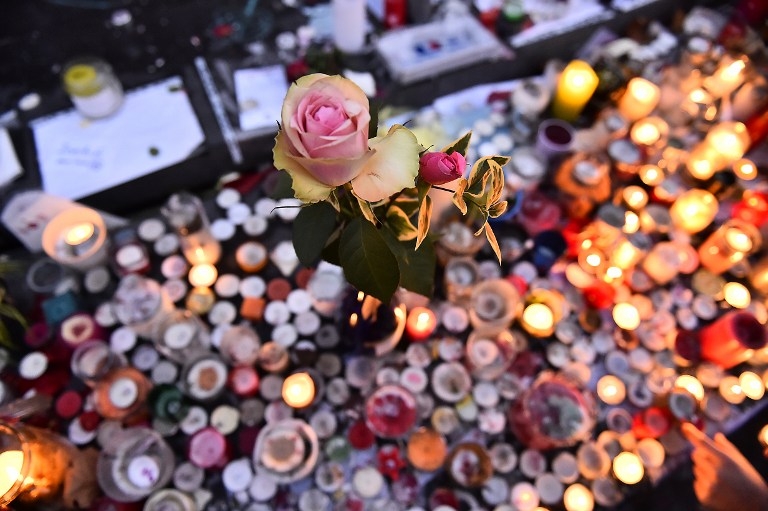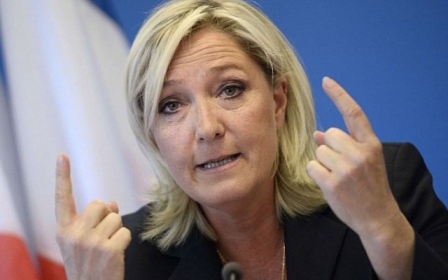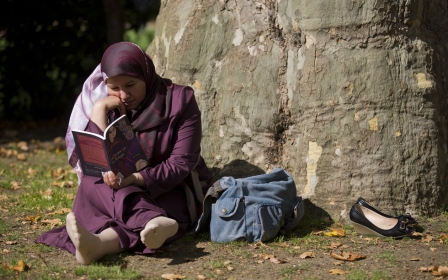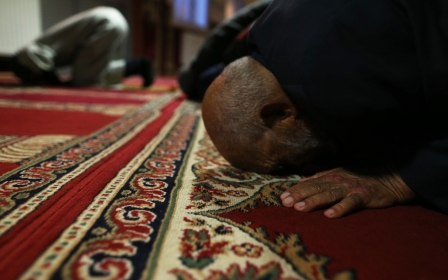Parisians look to the right in aftermath of IS attacks

PARIS – Rue de Charonne, in front of the terrace at La Belle Equipe. Yvonne has lived in this area for 60 years. Although the elderly lady readily discusses her concerns with Middle East Eye, she gets tense when it comes to talking politics.
What does she make of the security measures announced by President Francois Hollande in the wake of the Paris attacks?
"They’re too weak, they're not up to the challenges," she says firmly. "In any case, [Hollande's] Socialist Party know they are doomed."
She has different feelings about the National Front, and its leader Marine Le Pen. "These events prove that she was right. She had been warning us that we are allowing migrants in without carrying out any kind of checks".
In front of the Bataclan are Delphine and Nicole. They live nearby and on the evening of the attacks were sitting on a terrace just a stone's throw away from the Petit Cambodge, a restaurant that was attacked.
They spoke to us of the "trauma experienced by everyone in the district, who can’t help but think constantly about this awful event".
"What's more, we haven't really had the opportunity to express what we feel as all demonstrations are banned. Our need for closure is being refused by a government in a state of emergency," says Delphine.
"You get the feeling that opinions are hardening wherever you look. In fact, we are quite afraid for the next elections because a lot of people have lost all confidence in the system."
In the same area, Mariam, a Parisian originally from Cameroon, feels only "anger" after the attacks. She rails against the migrants, "some of whom are certainly poor people but most of them have been sent by the leaders of Islamic State", and expresses her bitterness against the government "who have let all of these terrorists in".
Mariam is also afraid. On the evening of the attacks she was at a party at her cousin's home in Saint-Denis, just opposite the apartment where some of the attackers were staying.
"Imagine it. They were possibly watching us. I feel nothing but hatred," she says. "Especially as these same people are in Cameroon right now with Boko Haram and are wreaking havoc. They want to invade everywhere."
For the first time in her life, Mariam, who has always voted for the left, says she will be supporting the National Front at the next elections.
A party with a purpose
Despite the electoral campaign being suspended due to the attacks, everyone is hard at work over at the Paris headquarters of the National Front. Volunteers call party supporters to ask them to become scrutineers at the polling stations for regional elections on 6 and 13 December.
A week after the Paris attacks, the NF feels it has been proven right. "There have been very few official statements during the three-day mourning period. When the [election] campaign gets under way again, the NF won't need to change its message because unfortunately what has happened is exactly what the NF has been warning about for years," says Aurelien Legrand, the young NF campaign manager for the Paris region.
As he sees it, there is not the slightest doubt that the security measures implemented by Hollande after the Paris attacks this month "are all NF solutions".
"This makes me all the angrier because if they had listened to us after 11 January following [the attack on] Charlie Hebdo, instead of ignoring the problem, maybe these people would still be alive".
Legrand says that following the attacks, the number of telephone calls to the NF "has exploded". "There had already been an upturn after 11 January but after 14 November the figures went through the roof. People are telling us: 'Right, I need to act now, I just can't sit by any more'." He adds that France must safeguard its "national sovereignty" if it is to protect itself.
Pierre, a volunteer, is convinced that the Paris attacks will bring supporters to his party. "My parents have ideas close to those of the NF but had not yet been able to bring themselves to fully support the party. I spoke to my mother on the phone recently and she told me 'Yes, there's no longer any option, it's the NF now'. She is 76 years old and has always been very moderate," he adds.
Aged 20, Jordan Bardella is heading the list of NF candidates in Seine-Saint-Denis, a working-class, mulitcultural area to the north of Paris. He reports much the same thing: "Several people have called me since the attacks to say 'this is the straw which breaks the camel's back'. There are also people introducing themselves as Muslims who say 'I'm going to vote for you'.
He believes the NF will emerge victorious in the regional elections. "The NF came out on top here in the European and departmental elections. A recent poll has shown that the NF is the most popular party."
The failure of the state
Nicolas Lebourg, a specialist in far-right movements, sees things this way: "One of the messages of terrorism is that your state can no longer protect you. You entrust your freedom to it but it doesn't guarantee your security. This will therefore generate disgust in the state as we know it today. And if no one can have trust in the state, we’re heading for chaos."
Lebourg says that the Muslim electorate still remains very hostile to the NF, "even if the NF tries to say otherwise".
"This is an electorate which will go the extra mile to try and block the NF as it views this party as a danger for them. But the NF continues to say that because this helps de-stigmatise them."
Lebourg says that Hollande is simply trying to "stem the haemorrhage and to quieten the rising clamour... Since Hollande’s term of office began, we have seen a constant stream of social democratic voters shifting from the Socialists to the NF".
This was the situation before the attacks and it will certainly have been further accentuated by them.
"According to studies, France is a fragmented and divided country with hostile communities within its borders," he says. "For the extreme right to enjoy the best possible conditions they need to build a mythology which involves an enemy within and an external enemy. We now have this scenario: IS in Syria and IS in France, with Frenchmen heading off to take part in jihad and subsequently returning."
New MEE newsletter: Jerusalem Dispatch
Sign up to get the latest insights and analysis on Israel-Palestine, alongside Turkey Unpacked and other MEE newsletters
Middle East Eye delivers independent and unrivalled coverage and analysis of the Middle East, North Africa and beyond. To learn more about republishing this content and the associated fees, please fill out this form. More about MEE can be found here.




